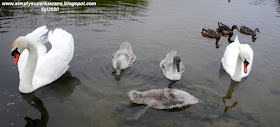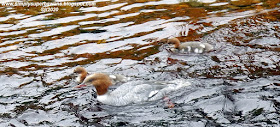Just before 12 today, I witnessed an unattended white and brown Spaniel taking a duck from the riverside behind the Seaman's hall in Fishertown. I was unable to stop it running away with the bird, but have informed the Police and SSPCA. After spotting the Spaniel accompanied by a Black Labrador as well. I have made some initial local enquiries and believe I now know both dogs names. The Spaniel is called "NIP" and the Labrador is called "MULL". resident in the Fishertown area.
The Trust would appreciate the name and address of the owners, to assist with their enquiries, in confidence.
Most of the birds on the River just now are completely defenceless, they are either Moulting or too young to fly. It is irresponsible to allow gun dogs, or hunting type breeds, to roam the riverside unattended and out of control ! The Trust is duty bound to protect our river wildlife, and spends time, money, and effort in this regard. Having seen the speed and stealth of this spaniel, I have no doubt it will take birds at every opportunity. IT MUST BE STOPPED!
WE ARE CUSTODIANS OF THE PLANET AND HAVE A DUTY TO CARE FOR IT. For the past 18 years I've had the privilege of watching and caring for the resident Swans on our local river estuary. I have been charmed and fascinated by their parental skills and beauty in the water, they are Simply Superb Swans. Annual Membership to the River Nairn Swans and Waterfowl Trust is £20 for a family, can be paid securely through the PayPal Donate button below. Thank you.
Wednesday, 29 July 2020
Monday, 27 July 2020
Best Start
The River wildlife has had the best start for some years, partially due to the virus pandemic and local conditions.
The lockdown meant less people and dogs around disturbing the wildlife during the breeding season, coupled with benign weather allowing weed growth for feed and cover.
Successful breeders will no doubt repeat their success next year. The Trust has been doing it's best to assist them with regular supplementary feeding, and improvements to the Moat water condition.
Birds are thriving and Cygnets the size of geese, with appetite's to match. Short video below.
Friday, 24 July 2020
Moulting Time
This is the time of year when moulting takes place on the river. Sue has now lost her main flight feathers and will be unable to fly for the next month, she and the cygnets will be totally reliant on Slim for protection.
Slim will not moult until Sue regrows her new feathers. Nature has ensured that one of the adults will always be able to fly to protect the young cygnets.
The male ducks also moult just now, leaving them vulnerable to predators, along with the ducklings.
Dog owners should take extra care ensuring their dogs are under control along the riverside.
Wednesday, 22 July 2020
Nature in The Raw
Thanks to a local couple Mark and Vicky for helping an injured drake this morning. They stopped me on my usual morning river round pointing to a Drake that was being pounced on by another !
This was again a caser of Nature in the raw, as it was in a previous post Dangerous Drakes.
Fortunately I was able to catch the injured bird as it was in full moult and unable to fly. Have given it some anti inflammatory pain killer and anti bacterial cream. It should make a full recovery and will be released when able to fly again.
Sunday, 19 July 2020
Evolution In Action
My observations on the river birds over the years have given me quite a few surprises and much learning and awe of nature. Season after season I have watched Mallard ducks hatch broods up to 14 strong, only to be preyed on by Gulls, Crows , Herons, Mink, Rats and Otters.
Often reduced to none or one or two survivors. I could not help thinking how much more successful they would be if they had the support of their partner Drakes, and why this never happened. The female Ducks have the task of watching over their brood while being pounced on by lonesome fertile drakes, often resulting in them having to flee in fear of their life! This leaves the ducklings at the mercy of predators.
Why has nature not taught them to have a mate for protection at this time, this would result in much more successful reproduction and survival of their offspring. Surely this would naturally evolve ?
Over the last few seasons I believe Evolution is in action in this regard. I have noticed that some mother ducks, have taken to reconnecting with their partners to tag along with the brood with marked success. They also seem to delay nesting which makes sense, more food and cover available, shorter nights, warmer, and crows have near finished feeding their offspring too.
Many other animals and birds have evolved the safety in numbers and family unit being the road to success. The video below shows our successful mother who started with 11 ducklings a month ago now down to 10 due in great part to her mate being close by. ( Notice him chasing off an intruder ) Evolution in action, one reason why swans are so successful too.
Thursday, 16 July 2020
Family Dip
For those of you who have not yet had the chance to see the cygnets growing, a short video below.
Brilliant sunshine and very warm today, birds all fed and watered, literally.
Monday, 13 July 2020
Stalking Heron - Camouflage
One thing about Herons, they are easy to photograph mainly standing stalk still.
Stalking prey is their speciality and ducklings are always on the menu.
However, some of the ducks are pretty wise and always keep a wary eye on them. Yesterday our mother duck with 10 ducklings, keeps them close by in the moat - with the Heron just yards away.
Ducklings blend into the background of stones exceptionally well, as you can see in this pic- Yes there are 10 there !
Saturday, 11 July 2020
Cygnet Preening
Seems like ages ago that the cygnets were balls of fluff, so thought I better show you all some close up video of a cygnet busy preening back then.
Wednesday, 8 July 2020
One Month On
Cygnets are a month old and already bigger than Mallard ducks!
Now eating the same feed as the parents ensures rapid growth.
Noticed also on the tidal reaches, a Cormorant drying it's wings, and a Goosander with 2 chicks.
Ready for release tomorrow, the female Duck injured by the drakes. Has made a full recovery after two weeks treatment - and hopefully avoid the villains now.
Sunday, 5 July 2020
Cute Ducklings
We have over 26 recently hatched ducklings on the lower river just now. Weather conditions are not in their favour with cold temperatures and a spate river.
Hatching can be a real hit or miss situation determining their chances of survival.
The Trust tries to mitigate this by ensuring they get sufficient protein to tide them through the hard times.
This evening I was gratified that a man and his daughter brought me a duckling they found at the Maggot, which I promptly returned to the mother at the Swans Island coinciding with feeding time. Ducklings are so irresistibly cute!
Saturday, 4 July 2020
Learning Lessons - Swan Behaviour
I am often asked questions about the Swans and their behaviour.
One which has come up several times over the years is " why do the parents sometimes fly away and leave the cygnets? "
I observe this behaviour every year with every brood of cygnets that have been hatched on the river.
The answer has become fairly obvious. It's always the Pen that triggers the quick flight away, followed immediately by the Cob. The flight only lasts a few seconds and takes them 50 or 60 meres away from the brood, but crucially within sight of them. The reaction of the cygnets is to bunch together, squeaking and paddle towards the parents. Likewise the parents paddle back towards the cygnets.
When they meet up there is an exchange of greetings with head nodding, squeaks and some sounds from the Pen.
I am pretty sure the lesson to be learned by the cygnets is, stay together, make calls, and we will find you. A simple but important lesson, that a large group is easier to find, and there is safety in numbers. Sequence of shots explains all.
FYI. The above pics were taken in 2016. Popeye and Penny's last brood together...and coincidentally one of the cygnets is now our present Mum Sue ...who has repeated the lessons to her brood below. Notice the age and size of cygnets, and same open mouth lecture by Mums !
One which has come up several times over the years is " why do the parents sometimes fly away and leave the cygnets? "
I observe this behaviour every year with every brood of cygnets that have been hatched on the river.
The answer has become fairly obvious. It's always the Pen that triggers the quick flight away, followed immediately by the Cob. The flight only lasts a few seconds and takes them 50 or 60 meres away from the brood, but crucially within sight of them. The reaction of the cygnets is to bunch together, squeaking and paddle towards the parents. Likewise the parents paddle back towards the cygnets.
When they meet up there is an exchange of greetings with head nodding, squeaks and some sounds from the Pen.
I am pretty sure the lesson to be learned by the cygnets is, stay together, make calls, and we will find you. A simple but important lesson, that a large group is easier to find, and there is safety in numbers. Sequence of shots explains all.
FYI. The above pics were taken in 2016. Popeye and Penny's last brood together...and coincidentally one of the cygnets is now our present Mum Sue ...who has repeated the lessons to her brood below. Notice the age and size of cygnets, and same open mouth lecture by Mums !
Thursday, 2 July 2020
Injured Ducks Recovery
After a week's treatment the female duck rescued last week from aggressive Drakes is recovering well.
There is now only a small area left to heal over.
The Injured Drake also rescued needed more intensive care, as he had suffered from a dog bite to the head and neck causing infection.
Antibiotics and anti inflammatory medication was needed for a week. The scars are still visible where he had been grabbed by the head and neck by a small dog.
Dog owners are remined that if their dogs are prone to attacking or chasing wildlife, they should be kept on a lead! The Trust will report to the wildlife crime officer and dog warden, any dog owner who allows their dog to attack or chase the river birds. Particularly during the moulting season when defenceless and hatched birds are around.
A reminder of what can happen to a moulting swan with cygnets, after a dog attack on Penny some years ago !
















































